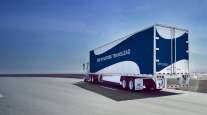New Trailer Orders Decline 4%, but Makers Remain Confident
This story appears in the April 9 print edition of Transport Topics.
Customers ordered a net total of 21,800 new commercial trailers in February, a 4% drop from last February, ACT Research Co. reported, but manufacturers were confident it was just a temporary lull.
The February figures also represented a 16.2% drop from January orders of 26,000, ACT, Columbus, Ind., said.
“One month is not a trend,” Frank Maly, ACT’s director, commercial vehicle transportation, told Transport Topics. “We had very strong orders to close out 2011 and then a solid January. The pause of orders in February was equivalent to a pause in builds, so that the backlog has remained the same, very strong.”
ACT said orders through the first two months of the year totaled 47,800 units, an 18.6% increase, compared with the first two months of 2011.
“Our order intake was very strong through the beginning of year and into February, when it did slow,” Charles Mudd, president of Vanguard National Trailer Corp., Monon, Ind., told TT.
“We then had a dramatic increase in activity in the in past two weeks,” Mudd said April 3.
“Looking back on the drop-off, my conclusion is that we saw a more traditional first-quarter lull, the first time in a few years we’ve seen that traditional seasonal lull,” he added.
Mudd expressed confidence that 2012 would be a strong year for trailer sales.
“We were polling our dealers and their confidence is strong, and no one felt any weakening in what the year would be like, but they all felt the slowdown,” Mudd explained.
“However, through that time period, I have not talked to a single carrier who has expressed doubt in the continued strength of the market,” he said.
“The January dry and reefer van new order and net order numbers were abnormally high and not sustainable . . . and our fall order numbers were also abnormally high,” Craig Bennett, senior vice president sales and marketing, Utility Trailer Manufacturing Co., City of Industry, Calif., told TT. “That is why the February numbers were lower.”
He said that Utility’s order rate is still good for both dry vans and reefers.
“The economy is also still quite strong,” Bennett added.
“We’re not quite as busy as we were 60 days ago, but it’s not dramatically different,” he said.
Flatbed orders also were rising, he said, but they still remained below their historical levels.
“Flatbed orders have been pushed by the oil and energy industries, farming and automotive,” Bennett said. “Housing construction is still not driving the platform market, but I think that is the next cylinder that will be here, next year, when we’ll need it.”
“February was a good month, but [it] is correct that most fleets started the process of buying trailers earlier in the cycle,” Glenn Harney, chief sales officer of Hyundai Translead, San Diego, told TT.
“March was similar to February, with some signs of pausing,” Harney added. “Given the strength in manufacturing and the need to replace aging trailers, we fully expect to see strong enough sales to fill out the year at the same pace we are on.”
David Giesen, vice president of sales and marketing for Stoughton Trailers, with headquarters in Stoughton, Wis., said his company went against the grain.
“For us, orders were very strong in February, above February 2011 levels,” Giesen told TT. “March was also strong for us, probably a little better than last year.”
Giesen said that improved customer confidence in the economy propelled orders.
“There’s a lot less worry about the economy, but there are still some worries,” he added.
Giesen said the orders were about an even mix between purchasing and leasing.
“We’ve always seen this same mixture,” Giesen said. “It’s really more an accounting thing for the fleets: Do they want to preserve their capital and lease, or spend it now?”
First-quarter orders were so strong he added, “we increased our plans for adding capacity.”
Stoughton’s order board for the third quarter was much fuller than January, Giesen said, but the company still had slots open.
He said he didn’t know if firms were expanding their trailer fleets.
“Customers don’t tell us their plans, whether they’re ordering trailers for replacement or to expand their fleets,” Giesen said. “However, I think there is growth going on.”
“We expect steady growth, both industrywide and for us,” he added.




